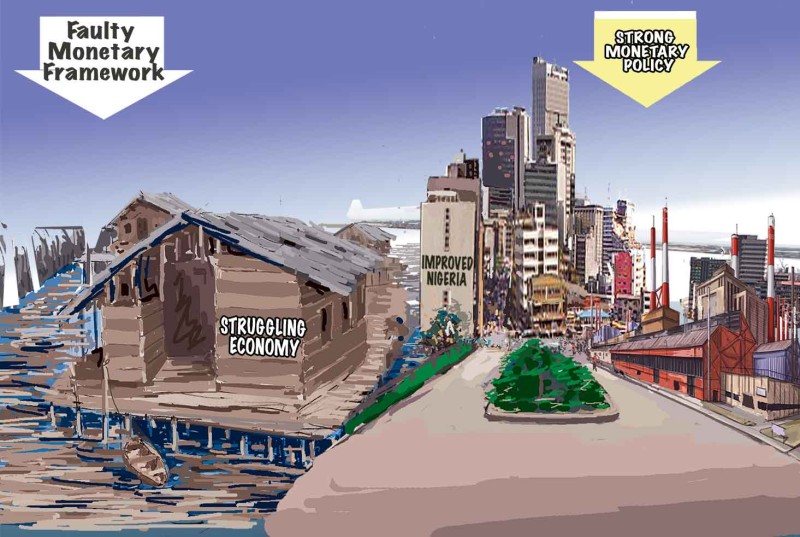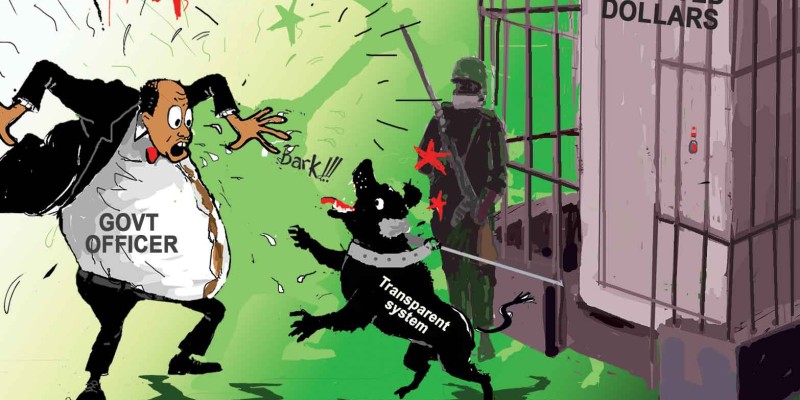ADDITIONAL DIVIDENDS OF A LIBERALISED FOREIGN EXCHANGE MARKET
By: Sir Henry Olujimi Boyo (Les Leba) first published in February 2012
INTRO:
Last week, this column republished ‘The Dividends of a Liberalised Foreign Exchange Market’.The article discussed the benefits of a foreign exchange system that works to appreciate the Naira, it can be found using the link below.
(See www.betternaijanow.com for this series and more articles by the Late Sir Henry Boyo)
Today’s republication is a precursor to last week’s article which was first published in 2005, and republished in 2012 to emphasize the ideas and recommendations it discussed. The below article speaks to the accountability and transparency that such a liberalized foreign exchange system would enforce, as well as the economic breakthroughs that would result. This article provides a breakdown of key advantages along with arguments in their favour.
As you read through the below article taking note of previous events or rates, keep in mind its year of publication (2012), a clear indication that Nigeria’s economic situation is yet to improve even after all this time.
In last week’s article, we discussed in detail the operations of a deregulated foreign exchange market; we described the structure of the market and the process for redeeming public sector forex allocations at the commercial banks and subsequent payment for imports of both private and public sector importers.
It is clear from the parameters of the market that the claim in the Monetary Policy Thrust of Vision 2020 that such a payment system would lead to capital flight is certainly untenable, unfounded and grossly untrue! The reality, of course, is that the liberal opportunities for corruption, round tripping, and speculative dollar hoardings, will be greatly minimized by a payment system that adopts the instruments of dollar certificates for the payment of dollar-derived revenue, as the cache of dollars will be disbursed from the custody of the Central Bank.
Indeed, it is tempting to speculate that it is this transparent regime and accountable structure of a liberalized foreign exchange market that has impeded the embrace of this simple solution to our economic problems by the prime stakeholders.
Incidentally, the stronger valued naira that would evolve from the new payment system would impact positively on fuel prices in the country. Indeed, fuel prices will fall, as naira value becomes stronger; thus, the issue of a subsidy component in fuel prices will become meaningless, as the ultimate price of fuel could even fall below the erstwhile price of N65/litre. In this event, government could raise at least a 10% sales tax (rather than pay subsidy of N70 or more) per litre of fuel consumed daily.
In this manner, the incessant attrition between Labour and the Civil Society on one hand and government on the other hand, on issues of fuel price hikes will diminish significantly.
The downstream sector of the oil industry will be quickly deregulated and investors will be encouraged to build and operate refineries for local consumption and for exports without hesitation!
Furthermore, the scourge of fuel smuggling across the boarders will also be heavily reduced, as the attractive profit margins made possible by a weak naira become quickly eroded.
In the rest of this week’s article, we shall discuss the additional dividends of a deregulated foreign exchange market, where CBN’s monopoly and stranglehold of public sector dollars create serious distortions, which poison our prospects of economic growth.
The following passage can be found on pages 27 – 32 in our flagship paper titled “A Liberalised Foreign Exchange Market: a proposal for a liberalized forex market in Nigeria and its economic benefits” Boyo/Ojomaikre, presented to National Economic Intelligence Committee in 2002. It can be found at www.lesleba.com. Please read on.
The main dividend to be derived from the adoption of a liberalized foreign exchange market as proposed in section 3 of this paper is the quick evolution of a realistically priced naira that will infuse the positive multiplier effects inherent in a free-market economy dictated by the dynamics of demand and supply. Indeed, the defects of the current system; viz lack of transparency, parasitic chain, price distortion and economic dislocation; would be cleansed by a liberalized market; the inherent features and desirable benefits may be summarized as follows:
A NEW IMPROVED CBN!!
The CBN would emerge unencumbered by the distraction of forex hawkings and intrigues and assume its role as a patriotic custodian of the naira and a nimble and effective policeman of the money market in line with national aspirations.
BREAKING THE JINX OF EXCESS LIQUIDITY
The mirage of excess liquidity whenever the federal pool is disbursed and the regressive reflex of mop-up activity inherent in the current system will disappear forever!! In other words, CBN would not have to plead with beneficiaries of the federation pool to desist from spending their income even when the economy is crying out for a dose of public expenditure to stimulate demand and investment.
The ghost of excess liquidity in the system will be laid to rest in the proposed liberalized foreign exchange market because of the following factors inherent in its operation:
The bulk of all foreign exchange earnings is expended in its original form (without any prior conversion into naira to needlessly and vastly swell money supply) to pay for the nation’s total import needs, that is, industrial goods, finished goods, contractors’ imports, services, every permissible “importable”, name it. This insulates the economy from a deluge of naira with extensive money creation possibilities by banks as at present.
Foreign exchange not required for domestic transactions by governments, public agencies and private sector operators will remain in the owner establishments’ domiciliary accounts with CBN and will not be regarded as part of commercial banks’ liquidity base.
A substantial proportion of foreign exchange converted into naira for domestic transactions is likely to be taken up by economic operators utilizing naira already in the system.
Thus, only a small portion of foreign exchange earnings may translate into injection of fresh money.
The subsequent arrival of imports paid for with the bulk of foreign exchange earnings especially consumer goods imply the introduction of additional physical goods which entails stretching the relatively unchanged money supply in the system to absorb the new imports. This situation will tend to leave prices at moderate levels. Inflation will therefore be at minimal levels that are conducive to economic growth.
REDUCTION OF PRESSURE ON THE NAIRA VALUE AND GENERAL STABILITY OF THE NAIRA
The effect of tamed excess liquidity on the industrial sector will be as follows:
• Industrialists will obtain cheaper dollars and consequently be able to bring in more raw materials and machinery with the same outlay as hitherto.
• Prices of locally manufactured goods will fall
• Industrial capacity utilization will improve
• Increased employment generating opportunities will evolve
• Disposable income will increase and overall demand will expand
• Demand for imported consumer goods will reduce as local manufactures will rise up to the challenge of filling the gap.
The above will lead to a reduction in demand for foreign exchange and consequently stabilize the exchange rate.
REDUCTION OF THE PRESSURE OF COST-PUSH INFLATION ON THE ECONOMY
Similarly, an improvement in the value of the naira will be reflected in reduced and stable costs of imported raw materials. As noted, investors in the real sectors of industry and agriculture can bring in more machinery and raw materials for production with lessamount of naira. Industrial and agricultural capacity will expand with the positive linkages in areas of employment generation, food sufficiency and generally improved welfare of the Nigerian masses.
INTEREST RATE REDUCTION AND STABILITY
CBN Minimum Rediscount Rate(the Commercial Bank Base Rate) need not be excessively weighted upwards in order to mop up excess liquidity caused in the current system by the conversion of dollar revenue to naira before sharing to constitutional beneficiaries of the federation pool. Lower interest rates would stimulate investment and enhance employment and generate aggregate demand with other salutary benefits in tow!
DEFLATION OF SPECULATIVE EARNINGS FROM THE FOREX MARKET
Speculative demand for forex at any cost from CBN will disappear as CBN will no longer sell dollars and any foreign exchange for that matter at a local bazaar! The erstwhile parasitic chain, round-tripping, excessive arbitrage income, dollar hoarding, artificial scarcity and the search for dollars at any cost will evaporate. Naira will be king and CBN will be well positioned to manage its good health! The parallel or black market will now provide less attraction and may be expected to gradually disappear as the dollar will be available everywhere in the money market!
EFFECTIVENESS OF CBN MONETARY INSTRUMENTS
The erstwhile discordant monetary instruments of CBN can now be used to fine tune the money market and bring harmony to our country’s monetary and fiscal policies; for example, CBN will not have to impose an MRR of 20% on the banks while government is at the same time pressurizing the banks to lower their commercial lending rates!
CONVERTIBILITY OF THE NAIRA
A stable and vibrant economy with a stable and resilient currency would give the naira the elite status and the prospect of transforming into a convertible currency. Naira convertibility would engender confidence in the country and the foreign direct investment that we have sought unsuccessfully so far in faraway lands, the same foreign investors will enthusiastically beat a path to our doors voluntarily! Convertibility will also transform Nigeria to the engine of growth for the ECOWAS sub-region in particular and a leading emerging industrial nation.
AVAILABILITY OF PROMPT AND ACCURATE INFORMATION
The late and often inaccurate returns which characterize the current system will disappear under the proposed liberalized foreign exchange market. As in advanced economies CBN will have a fairly good picture of the state of the economy within a lag of no more than two days.
The CBN audit officers located in financial institutions will be expected to send correct returns of each institution’s transaction in forex activities as well as other financial transactions of interest to the CBN every day. Availability of such database would enhance CBN’s ability to perform its statutory job of policing the banks to ensure that their operations are in line with policy.
MANUFACTURING FOR EXPORT
The presence of a transparent and level playing field and a liberalized foreign exchange market will provide additional motivation for foreign direct investors who recognize the huge opportunity presented in a market of 120 million people with rising disposable income. The net result will be an expansion in industrial capacity and ultimately the satisfaction of local demand for erstwhile imported consumer goods. Excess output from such production will become available for export.
Foreign direct investors will be encouraged to show interest in the commercial development of areas of infrastructure that have retarded our social and economic growth. This will supplement the services provided by the public sector and reduce the pressure on public sector capital votes.
CONCLUSION
The advantages of the liberalized foreign exchange market as espoused above are overwhelming. The CBN’s market-based approach to fixing the exchange rate via SFEM, IFEM, AFEM, FEM and DAS over the past two decades has succeeded in under-developing and ruining the economy. The economy, Sphinx-like will be resurrected through the instrumentality of a realistically valued and stable naira arising from the proposed liberalized foreign exchange market. We therefore recommend it for immediate adoption and implementation.
Certainly, the operation of an economy does not follow exact and fixed laws as we have in the physical sciences. So, we concede that there might well be other approaches that may lead to success. Those options do not include the route taken by CBN over the last two decades. We shall welcome alternative suggestions that are as viable as the approach offered by the liberalized foreign exchange market or better.
SAVE THE NAIRA, SAVE NIGERIANS!!
Note: The link in the article has been replaced by www.betternaijanow.com









